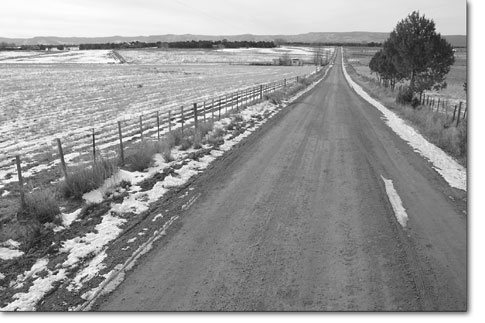| ||||
A guide to greener pastures
by Jeff Mannix Tim Brookes, a Brit who discovered America atop a bicycle, settled in Burlington, Vt., with a plum teaching job at the state university and never left. Now director of the writing program at Champlain College, Brookes has compiled a number of winsome essays about moving with his family 35 miles out into the country, to grow intellectually among the pure forces of nature then ultimately rue “the balance of power between order and chaos.” The Driveway Diaries: A Dirt Road Almanac emerged from a regular column Brookes wrote for a local newspaper. Many of his musings about exurbia have been broadcast on National Public Radio’s Sunday Weekend Edition and most recently excerpted in Harper’s Magazine. The book chronicles his first seven years of living just beyond the suavities of a city. As the realities of unassisted living supplant the expectations of harmonious enlightenment, Brookes staves off organic dementia by writing eloquently in 63 essays about unimproved existence. The Driveway Diaries is a good pocket guide for anyone who leaves the pavement for greening pastures, and is especially informative of what is awaiting the ecstatic, rejuvenated immigrants fleeing to La Plata County. Open space is lovely, and there are certainly moments of bliss living on the land, but it comes at a cost that most urbanites haven’t budgeted for and can ill afford. Precursors to catastrophe begin right away for Brookes and, likewise, for everyone moving to Bayfield or Breen, if they only saw yesterday what they see today. Drought was the first harbinger Brookes saw after closing the deal on his dream life. Sound familiar? Expectations tarnish for Brookes and his wife, but not before putting up the good fight with moments of splendor over ridiculously simple rewards. Brookes began to write about his curiously absurd experiences, reminiscent of a castaway writing a journal to keep from losing his mind. The best of his essays are about dirt roads, if you can imagine such contemplation, and reason enough to go right to Maria’s Bookshop and pick up a copy of this confessional. In his essay entitled “Seventeen Ways of Looking at a Dirt Road,” Brookes puts in perspective why we who live in the country endure the privations.
In his essay entitled “Seventeen Ways of Looking at a Dirt Road,” Brookes puts in perspective why we who live in the country endure the privations. “Dirt roads are a communal creation, not suffering from the autocracy of engineers,” preaches Brookes. “A dirt road is a long-running experiment in sustainable transportation … the perfect hybrid: half road, half part of the landscape.” We who use dirt roads can see that they followed section lines, cow paths, migration trails – evolving naturally instead of being placed for anticipated traffic. “A dirt road knows its place, and doesn’t claim to own all it sees,” observes Brookes. “It’s still obedient to the rise and fall of the land … there’s nothing like a dirt road to demonstrate, without condescension, the diversity of the state, to assert its democracy. With a dirt road, we are someone: We do not pass unnoticed or unremembered … it acknowledges our progress in a cloud of dust, or in the curling lip of a rut.” It’s hard not to extrapolate our own existence, our small footprints on the ground, from Brookes’ eloquent treatise. “Dirt roads are self-policing,” Brookes pleads, “you can’t go all that fast on a surface that creates its own speed bumps” and “enforces humility.” Still yearning for order among chaos, Brookes proposes that “Dirt roads don’t lie. A paved road – a ‘good’ road – underlies us like a safe assumption, its smooth silence reassuring us that this is where we and our car belong. But a car doesn’t belong anywhere. It’s only a native species in the fictional world in which we are masters of the earth. A dirt road doesn’t respect this fiction. If we want to believe in our ascendance over our surroundings, the last thing we want is a rude series of jolts that remind us otherwise.” Brookes’ insights, especially about dirt roads and driveways and the human intrusion upon nature, inspire reflection upon the importance we place on improvement, how we just may have it reversed. He’s convincing, in a charming, humorous manner that will ring true with vicissitudes facing our own backwater hamlet: “The road that leads to paradise also provides the means of its destruction,” presages Brookes. •
|
In this week's issue...
- December 18, 2025
- Let it snow
Although ski areas across the West have taken a hit, there’s still hope
- December 18, 2025
- Look, but don't take
Lessons in pottery theft – and remorse – from SW Colorado
- December 11, 2025
- Big plans
Whole Foods, 270 apartments could be coming to Durango Mall parcel



